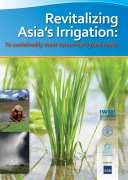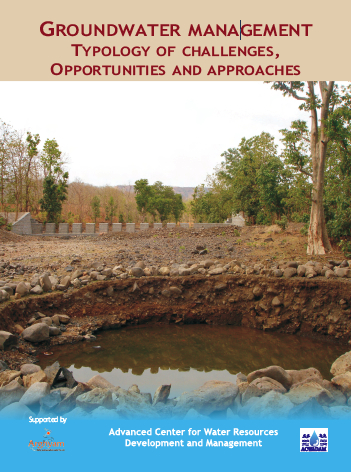/topics/irrigation
Irrigation
Agriculture Rainwater Harvesting - Newsletter from International Rainwater Harvesting Alliance (IRHA)
Posted on 11 May, 2010 04:50 PMInternational Rainwater Harvesting Alliance (IRHA) was created in Geneva in November 2002 following recomendations formulated during the World Summit for Sustainable Development in Johannesburg two months earlier. The mandate called for federation and unification of the disparate rainwater harvesting (RWH) movement around the world, to promote rainwater as a valuable water resource and to build on achievements in this field for the fulfilment of the Millennium Development Goals.
In partnership with the most eminent organisations and individuals in the field, the IRHA provides a lobbying and advocacy platform for RWH. It supports the growth of RWH solutions to water supply problems. It also provides a forum for its members to work together or share experiences, and thus for the benefit of people living with water scarcity.
Topic of this issue: Agricultural Rainwater Harvesting
Revitalizing Asia's Irrigation: To sustainably meet tomorrow's food needs - A report by IWMI and FAO
Posted on 20 Apr, 2010 03:14 PM This document by International Water Management Institute (IWMI) highlights the urgent need for improving irrigation systems to enhance food production to meet the needs of the growing population in Asia, in the context of increasing urbanisation and the challenges posed by climate change.
This document by International Water Management Institute (IWMI) highlights the urgent need for improving irrigation systems to enhance food production to meet the needs of the growing population in Asia, in the context of increasing urbanisation and the challenges posed by climate change.
Experience has shown that improvement in irrigation systems have led to improvement in agricultural growth in Asia in the past where irrigated agriculture still continues to be the heart of rural growth.
However, experts estimate that demand for food and animal feed will double during the next fifty years in Asia. This will require better management of the existing irrigated lands as opening up of new alternatives is constrained by lack of land and water resources.
Using energy pricing as a tool for efficient, equitable and sustainable use of groundwater for irrigation
Posted on 20 Apr, 2010 07:14 AMThe paper analyzes the potential impacts of energy pricing on efficiency, equity and sustainability in groundwater use. The overall objective of the study is to analyze the socio-economic viability of pro rata pricing of electricity in agriculture. Specific objectives are:
- To study the impact of change in mode of electricity pricing on efficiency and sustainability of groundwater use by well owners
- To analyze the overall impact of electricity pricing on the farming system of well owners, including the economic prospects of farming
- To analyze the impact of change in mode of electricity pricing on the functioning of water markets
Evolving an integrated approach for improving efficiency of electricity-driven pumping of groundwater for agriculture - A discussion paper by CWS and Prayas
Posted on 20 Apr, 2010 06:57 AMThis study explores possibilities of local energy and groundwater management in Andhra Pradesh with the involvement of farmers for constructive contribution in improving the field situation in electricity supply and groundwater management.
Ground water pumping using electricity is a complex issue, leaving all actors - the farmers, distribution company, State government and environment conscious analysts - frustrated and dissatisfied. Farmers are frustrated with the poor quality of electricity supply, distribution companies with the low revenue, State government with the high levels of subsidy and the environmentalists with inefficient water use resulting in falling water tables. Level of mistrust between actors is also quite high. The process of evolving a sustainable solution is not clear.
In this context, this study by Prayas Energy Group and Centre for World Solidarity (CWS), explores:
- Grassroot and state-level insights, regarding electricity use and water management in agriculture
- Developing a simple methodology in consultation with farmers for collecting baseline field data and analyzing it towards improving the efficiency in a strategic way
- Possible areas of intervention in future
Water Policy in India - A brief overview: A paper by Centre for Public Policy (IIM Bangalore)
Posted on 20 Apr, 2010 06:30 AMThis paper by the Centre for Public Policy (CPP) of the Indian Institute of Management (IIM) Bangalore adds to the debate on water policy in India, and provides a general overview of the main characteristics of irrigation development post-Independence and a review of its beneficial and adverse impacts. The problems that need to be addressed and measures needed to resolve them are highlighted. It recognizes the vital role of expansion of irrigation in transforming agriculture from one of near stagnation in the pre-independence period to one of sustained growth during the past five decades.
Optimum water management in a command area - A research report by National Institute of Hydrology
Posted on 14 Apr, 2010 02:44 PMThis research report by the National Institute of Hydrology deals with optimum water management in a command area. The dynamics of water within the unsaturated zone of soil is a complex phenomenon dependent on properties of the atmosphere, soil and vegetation. For agriculture water management, it is necessary to have models that accurately predict the behavior of soil moisture.
In this study, a model is developed to stimulate the dynamics of soil moisture within the root zone in an agriculture command. Focus is given to incorporate the spatial variation in crop type, soil type and rainfall in the command area and the dynamics of soil-water-plant interaction is stimulated.
An innovative way of sharing diminishing groundwater introduced by APDAI
Posted on 27 Mar, 2010 12:55 PM“We no longer worry about the rains. We now have the confidence to grow alternative crops even if the monsoon fails,” said Balaraju, a farmer in one of the most drought-prone and economically vulnerable regions of Andhra Pradesh in southern India.
Barrages as a better alternative to Polavaram dam project
Posted on 20 Mar, 2010 06:34 PMBARRAGES AS A BETTER ALTERNATIVE TO POLAVARAM DAM POJECT
(Replies to Discussion Report of Advisory Committee on alternate proposals made for
Polavaram project by Sri.T.Hanumantha Rao, former Engineer-in-Chief, AP State)
The wells brim with water in drought-prone Gujarat
Posted on 19 Mar, 2010 09:20 AMTHE WELLS of Kalawad village in Junagadh district, Gujarat brim with water. The reason — construction of check dams by a peasant, Mr.
Groundwater Management - Typology of challenges, approaches and opportunities - Research papers from the conference organised by ACWADAM and Arghyam at Pune (May 2009)
Posted on 17 Mar, 2010 04:40 AM A workshop on groundwater was organised by ACWADAM and Arghyam Trust in Pune in May 2009, that brought together several experts in the field, and explored diverse topics such as the importance of scale in groundwater resource planning and management, importance of aquifer typologies, participatory processes of groundwater management, groundwater regulation and groundwater linkages with watershed development, markets and policy matters.
A workshop on groundwater was organised by ACWADAM and Arghyam Trust in Pune in May 2009, that brought together several experts in the field, and explored diverse topics such as the importance of scale in groundwater resource planning and management, importance of aquifer typologies, participatory processes of groundwater management, groundwater regulation and groundwater linkages with watershed development, markets and policy matters.
The attempt of the workshop and research papers presented, was to highlight contemporary issues in groundwater management, and to look at it through the multiple lenses of hydrogeology, sociology, economics, livelihoods, environment, disasters and so on.




